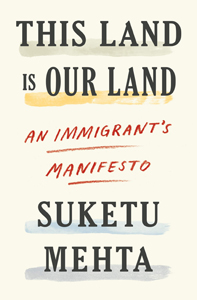 Suketu Mehta, This Land is Our Land; An Immigrant's Manifesto (New York: Farrar, Straus and Giroux, 2019), 306pp.
Suketu Mehta, This Land is Our Land; An Immigrant's Manifesto (New York: Farrar, Straus and Giroux, 2019), 306pp.
Suketu Mehta's family moved from Bombay to New York City on October 1, 1977, when he was a young boy. His "manifesto," which he admits was written out of "sorrow and rage," is both deeply personal and unapologetically polemical. Today Mehta is an associate professor of journalism at New York University. His previous book Maximum City: Bombay Lost and Found was a finalist for the 2005 Pulitzer Prize.
Mehta begins with the observation that many people have made, that immigration is the defining issue of our globalized world. About 250 million people today live in a country other than the one in which they were born. Another 750 million say they want to move from the land of their birth, and will do so if given the chance. There are 65 million refugees all around the world who have been forcibly removed from their homes. There's Lebanon, where a third of the population are refugees. Thirty million stateless Kurds. Over a million Syrians in Jordan, which would be the rough equivalent of sixty million refugees in the United States.
In Mehta's view, immigrants move to other countries for clear reasons: the history of colonialism (eg, British India, French Algier, or the Belgian Congo), what he calls the new "corporate colonialism," wars, and climate change. He also examines at length the populist and xenophobic narratives that cause us to fear the stranger. In the last part of the book he suggests a number of positive reasons why we should welcome immigrants instead of fearing them.
I think there are better resources on this important subject. I especially appreciated The Line Becomes a River by Francisco Cantú, The Far Away Brothers by Lauren Markham, the memoir Tears of Salt by the Italian doctor Pietro Bartolo, the novel Americanah by Chimamanda Ngozi Adichie, and the documentary film Human Flow by Ai Wei Wei. But Mehta is right in this regard: there are some important things that ought to make us angry and that call for our compassion: "I am not calling for open borders," he writes, "I am calling for open hearts."
Dan Clendenin: dan@journeywithjesus.net


